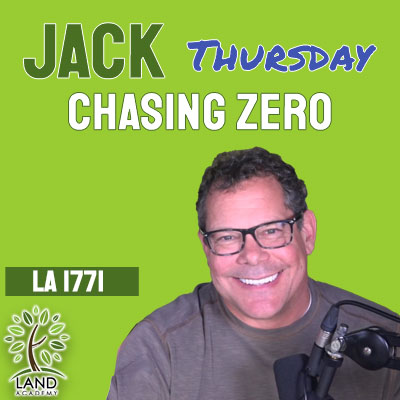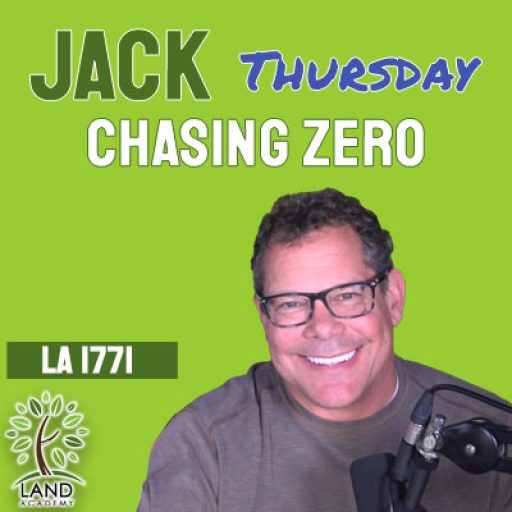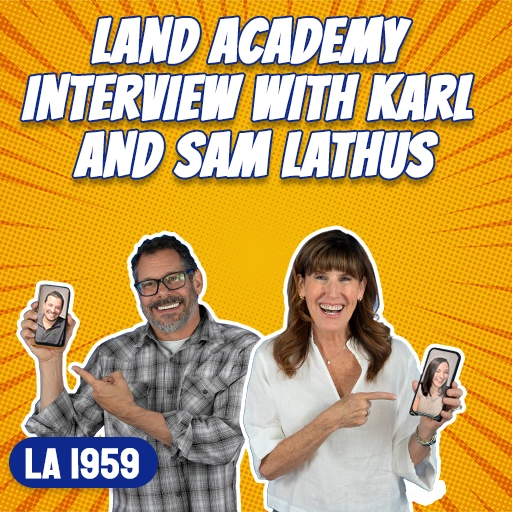Jack Thursday – Chasing Zero (LA 1771)
Jack Thursday – Chasing Zero (LA 1771)
Transcript:
Steve and Jill here. Welcome to the Land Academy Show, entertaining land investment talk. I’m Steven Jack Butala.
Jill: And I’m Jill DeWit, broadcasting from the valley of the sun.
Steve: Today is Jack Thursday and I’m going to talk about this concept I created quite some time ago that just doesn’t seem to die. It’s sung to some people called Chasing Zero.
Jill: I’m excited. I love it. This comes up often. I’m trying to think of, probably because of career path, it comes up in career path. You talk about it and we’ve done a few shows on this. This whole topic and this description intrigues people, myself included. So, I’m glad we’re doing another show on this today.
Steve: Good, Jill. Before we get into it though, let’s take a question posted by one of our members on the landinvestors.com online community. It’s free and don’t forget to subscribe to the Land Academy YouTube channel. Comment on the shows you like.
Jill: Josh wrote, “Hi all, new guy here with a quick question. Got my first mailer and I’m getting some responses. Tried to bring my wife into the operation/discussion, but she’s having a hard time wrapping her head around the vacant land, then I mentioned houses. Her interest peaked quite a bit and she’s been looking at the House Academy public website. Curious of your thoughts on House Academy training business model, and if any other newbies are doing both, or houses exclusively. Likewise, any thoughts as to why the House Academy podcast and overall focus from Jack and Jill has waned a bit? Market? Just making that model less appealing? Feel free to PM me if that’s easier.” Oh, I love it. This is good.
Steve: This is a very popular topic on discord.
Jill: Yep.
Steve: There is a lot of responses to this.
Jill: I bet.
Steve: I love buying and selling houses.
Jill: Me too.
Steve: Right now it is the most competitive I’ve ever seen it in my entire career.
Jill: And I don’t want to play.
Steve: If you talk to any homeowner, especially in those target areas, with mid range, two, three, four hundred thousand dollars, buy it for 300, sell it for 400 without any real renovation, they’ll tell you that they get two or three offers a week.
Jill: Right.
Steve: And very frustrated. They’ll tell you in a very slam it down on the desk frustrated way. We don’t care to run with that, so much competition. We could make it work. We’ve done it. When the market … and everybody said this on discord.
Jill: Isn’t that funny?
Steve: I’m reiterating it. When a market chills out a little we’ll get back into it.
Jill: It seems counterintuitive, but you’re like, “Wait a minute. Why would you want now to buy houses and jump in the pool when it’s so hot because everything sells so fast?” But, Steven’s right, because of the whole way that we operate everything is buying it right. If I’m in a bidding war with somebody else, I’m not buying it right. It’s just too nutty. I like it to be slowed down a little bit, not as much competition, I can get some smoking deals, mark it up very effectively, and then sell it and move on.
Steve: Here’s the truth.
Jill: But I like houses, too.
Steve: Here’s the truth time. If somebody put a gun to my head and said, “You’re going to buy and sell houses now.” I would sit down. I would run data like I run it now with some changes, and then I would look at the pretty rural markets that are pretty solidly served by useful internet service providers so you can get a good connection, because everybody seems to be … more and more people are working from home and moving out into outlying areas. So I could choose the right rural markets and buy and sell houses all day long.
Jill: Correct.
Steve: The fact is, and if I had a nickel for every Land Academy member that came to Jill and I and said, “Wow, thank you. I’m so much out of the house business now. It’s so much easier and more profitable to buy and sell land.” It’s just land is better and it’s in our souls, both of us. It’s not to say that houses aren’t. Here’s my real concern and here’s why I added your question, very, very, very, concerned that your wife likes interior design.
Jill: Oh.
Steve: And not math.
Jill: HGTV.
Steve: Mm-hmm (affirmative).
Jill: I got it.
Steve: Because the last things Jill and I have ever done and will ever do, we did it one time, is renovate a house. Jill and I buy the house. We may vacuum the carpet.
Jill: Did some paint.
Steve: We may paint it.
Jill: Paint, clean the carpet.
Steve: But we will certainly never replace appliances or start down any renovation path that’s a disaster for our personality types. Those shows are all fake on HGTV. The numbers aren’t right. That’s just not what this is. We’re not renovators.
Jill: No.
Steve: And every renovator I talk to is just always slowly going out of business.
Jill: All those shows are, we all know that, it’s just the before and after people want to see like, “Wow, look how pretty that kitchen is. I think I want mine to look like that.” That’s what that is. That’s it. It’s interesting.
Steve: Today’s Jack Thursday. I’m going to talk about chasing zero. This is why you’re listening. Jill and I have had exactly two live events and then Covid happened and we stopped it. Are we going to have another live event or future live events? Probably. I just don’t know exactly when. It hasn’t been a tip top priority. In the last live event, I did a module called Chasing Zero. Thought nothing of it, just probably 10 or 12 or 20 other modules that I presented, Jill presented, and other speakers that we hired to be there, but this one won’t die. Every, probably, month or so somebody says, “Bring back Chasing Zero. Are you going to write a book about Chasing Zero?” So, here’s the deal. I had no idea that this would stick. I realized several years ago that I’ve been chasing zero and it’s probably not mentally healthy, but this is what it is.
When I sit down to do a task or I look at my calendar in the morning and I have to do a bunch of stuff, without consciously realizing it, what I’m trying to do is eliminate that so I don’t have to do anything. I’m chasing zero and so I’ll have a meeting, let’s say, with our marketing department or I’ll have a meeting with Jill about some topic like, let’s say we’re thinking about now cranking up Jill live or whatever, and my soul intent to have that meeting is to put the people in place and provide the tools so I don’t have to do anything including really be involved in it at all.
I realized that that’s how I operate. All the tasks that I do for whatever I’m responsible for, whether it’s involved in the Land Academy companies themselves or buying and selling land, in the end in my mind where you finally get to that point where you’re coasting and you’re kind of happy or content I should say, you’re only doing the stuff that you want and you’re only spending as little amount of time … You’re doing the critical stuff that makes you you, makes your company yours. And only you can do that. For some people who are … The opposite of this is a control freak, is somebody that’s got to touch everything, do everything, and sit next to the person who’s actually going to implement whatever you’re asking them to do. Sit next to them at the desk and watch every keystroke. I’m exactly the opposite of that. I want to put the right people in place, probably to a fault, right people in place so that I don’t have to actually ever talk to them again and it just spits money out. That’s chasing zero.
Jill: Can I talk now?
Steve: Yes. Yes, save me. Jill’s like-
Jill: Oh no, I’m going to add to this. I’m going to pour some fuel on the fire. You’ve even done this with children. He’s right now chasing zero.
Steve: Yeah, that’s right.
Jill: Yeah, I know.
Steve: The last one.
Jill: Exactly. Boy, you have it in you to do … It’s a good thing. It really is. We should all be working on … That means we’re all just having fun and you’re semi retired, by the way. That’s what chasing zero’s about. It’s a little scary when I look around and then look at the kids and how that’s going. I’m like, “Thank goodness I’m not on the list, or am I on the list?” Just kidding.
Steve: Oh geez.
Jill: I know, I’m just kidding. No, it’s good. What I find, you talk about people that micromanage it. I just find more people that can’t even do it. They can’t hire that employee and trust that that person’s not going to do it as well as them, but so what? Or maybe it takes two people to do what you used to do. That’s okay, too. That’s the only way you’re going to get there. The end goal here is you’re only working a couple hours a week.
Steve: To effectively implement chasing zero, there’s a lot of criticism about this. We’ve all read book and read blogs, or maybe not, but there’s a certain personality type that pulls us off and it’s not a very often not, they don’t make for a pleasant person to be around. It’s very frustrating when you hire somebody and then find out that they’re not a self starter, they’re not an independent … They can’t solve their own problems and they just need a lot of attention and a lot of help. Chasing zero is not efficient. It’s very cumbersome and it takes a long time, and you ask any business owner, any business owner with any amount of success, and they will without hesitating say, if you ask them, “What’s the most difficult part about business,” and they will say, “Staffing.” You have to really work this into, if you’re a chasing zero type person, work this into your hiring policy and make sure that upfront, that the people that you want to surround yourself by, or surround yourself with, are conducive to that chasing zero type personality because they themselves are probably chasing zero without knowing it.
Jill: Sometimes you have to go through a few people to get there.
Steve: Probably like eight or nine.
Jill: And here’s the thing, the right person comes along and says, “Thank goodness.”
Steve: Yep.
Jill: “I’m so happy to be here because where I used to be before, we had these policy procedures and no one ever bended. It was always, if it’s up to $100, you do this. Over $100, you do that,” whatever it is. Fill in the blank kind of thing, “and I couldn’t really take a step back and make some decisions that I knew were good business decisions and implement them.” The right person thinks like that and I love that.
Steve: This is more of a philosophical way of life than anything else. I’ll give you an example. I started in real estate in the early 90s as a commercial real estate broker, buying and selling and wearing a lot of different hats, but in the end I was buying and selling either for myself or other people, longterm care facilities, nursing homes, and assisted living facilities. I know it now, but looking back, I was trying to chase zero and I was always frustrated. I was frustrated at how long it took people to make decisions, whether or not they’re going to buy and sell it. I was frustrated with government compliance and checking with everybody for reimbursement standpoints. It takes a year to do one of those deals, even now, even today with technology. Everyday I’m waking up, getting more and more and more frustrated, and so step by step by step, I developed this buying and selling land concept where no one’s involved at all. In a lot of cases, a real estate agent is not involved. On the buy side, a real estate agent still is never involved. We just recently allowed real estate agents to be involved on the sales side, usually for years and years Jill and I-
Jill: It was just us.
Steve: We sold the property ourselves.
Jill: Exactly. Isn’t that funny? Even then when people had a buyer … a buyer came to me with an agent, I would be like, “God darn it. I don’t even want to talk to them.” We changed our tune.
Steve: About a year ago we started to use Air Table in a big, huge way and it’s changed our lives. Fast forward to now, we’ve got everybody involved in our companies, just in Air Table all day long, reporting the tasks that they’re doing, letting us know so our efficiency, our workload efficiency, and specifically buying and selling land, is just shot through the roof. It’s removed communication entirely, verbal communication, and email type communication entirely. There’s always another step to chasing zero.
A great example is a mortgage. I’ve never had a mortgage in my life where I’m like, “All right, here’s the plan to pay it off.” I’m chasing that zero. I want to go to zero. I don’t want to … way, way long before it’s fully advertised.
Jill: Happy you could join us today. Five days a week you can find us here on the Land Academy show.
Steve: [inaudible] Jill Friday, she’s going to brighten up what I just darkened and she’s going to talk about the real relationship you need to establish with your seller to get a deal done. You are not alone in your real estate ambition.
Jill: Oh, that’s good.
Steve: You kind of cut me off early.
Jill: We didn’t need one more example. We had 12.
Steve: Okay. Thanks for reeling it in.
Jill: If I added 13 to be like, “All right, we gotcha.”
Steve: The vast majority of podcasts are just some guys in his basement talking. I’m sure that they needed Jill to say, “Yep, that’s good. We’re good.”
Jill: Yeah.
Steve: Thank you.
Jill: Welcome. Thank you for tuning in, and by the way, probably by now you have seen an email that we reopened Land Academy. So, check it out. Go to landacademy.com and there’s some special stuff going on throughout this holiday weekend.
Steve: We are Jack and Jill. Information-
Jill: And inspiration.
Steve: To buy undervalued property.
If you enjoyed the podcast, please review it in Apple Podcasts . Reviews are incredibly important for rankings on Apple Podcasts. My staff and I read each and every one.
If you have any questions or comments, please feel free to email me directly at steven@BuWit.com.
The BuWit Family of Companies include:
I would like to think it’s entertaining and informative and in the end profitable.
And finally, don’t forget to subscribe to the show on Apple Podcasts.















